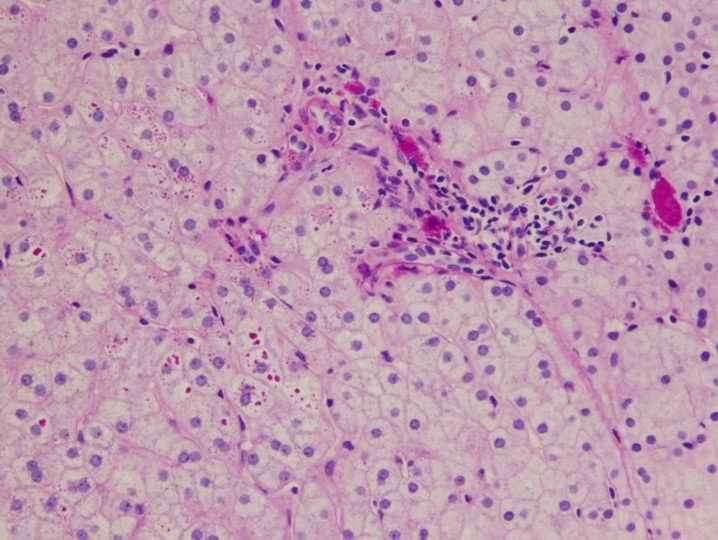Back
Poster Session E - Tuesday Afternoon
E0565 - Crypto Can Be Confusing: Cryptogenic Cirrhosis Occurring in Isolated Heterozygous Alpha1 Antitrypsin Deficiency
Tuesday, October 25, 2022
3:00 PM – 5:00 PM ET
Location: Crown Ballroom

Siva Santosh Kumar Gandu, MD
LSUHSC
Shreveport, LA
Presenting Author(s)
Siva Santosh Kumar Gandu, MD1, Simin Khan, MD2, Christopher Oglesby, MD1, Qiang Cai, MD1
1LSUHSC, Shreveport, LA; 2Louisiana State University Health Sciences Center, Shreveport, LA
Introduction: Alpha 1 Antitrypsin deficiency (AATD) is an autosomal co-dominant disorder involving the SERPINA1 gene occurring in individuals who inherit an gene from each parent. The homozygous ZZ variant is the well-known variant linked to severe emphysema, chronic hepatitis, and decompensated cryptogenic cirrhosis. This is a case of decompensated cirrhosis occurring in a heterozygous M, Z individual. The insidious onset, rapid progression, and lack of potentiating etiologies and risk factors add to the uniqueness of this case.
Case Description/Methods: Our patient is a forty-seven-year-old non-smoker, non-alcoholic, female with a history of menorrhagia and well-controlled hypertension. The patient reports to the clinic with complaints of abdominal distention, intermittent brain fog, confusion, and altered sleep cycles. The patient was admitted to evaluate and treat new-onset decompensated cirrhosis. Initial imaging revealed mild parenchymal changes and subtle nodular changes suggestive of Cirrhosis. Additionally, labs were negative for common infectious, metabolic, immunological, and genetic etiology. A biopsy revealed fibrotic changes consistent with cirrhosis, along with patchy intracytoplasmic inclusions of PAS-D positive spherical globules in hepatocytes consistent with alpha 1 antitrypsin deficiency. Additional testing for alpha 1 antitrypsin revealed an MZ genotype, and the serum levels of AATD were within the normal range. Symptoms or signs indicative of lung disease were never present. The patient was followed by transplant hepatology. Progression of disease was evidenced by Model for End-stage Liver Disease scores worsening from nine to seventeen four months after diagnosis. A successful transplant of the liver was completed five months after the initial diagnosis. There haven't been any signs of rejection in the first six months post-transplant.
Discussion: Alpha 1 antitrypsin (A1AT) deficiency is an underrecognized and underdiagnosed disease due to its profound clinical variability. Patients present during infancy or adulthood, and the effect of disease modifiers, such as smoking, alcohol, hormonal effects, and allele variability are not thoroughly understood. Additionally there's limited knowledge regarding occurrence of disease processes in heterozygous individuals. Individuals arent routinely screened for A1AT, however a biopsy may aide in arriving to the correct diagnosis. Early detection, allows for early transplant evaluation, genetic counseling and education.

Disclosures:
Siva Santosh Kumar Gandu, MD1, Simin Khan, MD2, Christopher Oglesby, MD1, Qiang Cai, MD1. E0565 - Crypto Can Be Confusing: Cryptogenic Cirrhosis Occurring in Isolated Heterozygous Alpha1 Antitrypsin Deficiency, ACG 2022 Annual Scientific Meeting Abstracts. Charlotte, NC: American College of Gastroenterology.
1LSUHSC, Shreveport, LA; 2Louisiana State University Health Sciences Center, Shreveport, LA
Introduction: Alpha 1 Antitrypsin deficiency (AATD) is an autosomal co-dominant disorder involving the SERPINA1 gene occurring in individuals who inherit an gene from each parent. The homozygous ZZ variant is the well-known variant linked to severe emphysema, chronic hepatitis, and decompensated cryptogenic cirrhosis. This is a case of decompensated cirrhosis occurring in a heterozygous M, Z individual. The insidious onset, rapid progression, and lack of potentiating etiologies and risk factors add to the uniqueness of this case.
Case Description/Methods: Our patient is a forty-seven-year-old non-smoker, non-alcoholic, female with a history of menorrhagia and well-controlled hypertension. The patient reports to the clinic with complaints of abdominal distention, intermittent brain fog, confusion, and altered sleep cycles. The patient was admitted to evaluate and treat new-onset decompensated cirrhosis. Initial imaging revealed mild parenchymal changes and subtle nodular changes suggestive of Cirrhosis. Additionally, labs were negative for common infectious, metabolic, immunological, and genetic etiology. A biopsy revealed fibrotic changes consistent with cirrhosis, along with patchy intracytoplasmic inclusions of PAS-D positive spherical globules in hepatocytes consistent with alpha 1 antitrypsin deficiency. Additional testing for alpha 1 antitrypsin revealed an MZ genotype, and the serum levels of AATD were within the normal range. Symptoms or signs indicative of lung disease were never present. The patient was followed by transplant hepatology. Progression of disease was evidenced by Model for End-stage Liver Disease scores worsening from nine to seventeen four months after diagnosis. A successful transplant of the liver was completed five months after the initial diagnosis. There haven't been any signs of rejection in the first six months post-transplant.
Discussion: Alpha 1 antitrypsin (A1AT) deficiency is an underrecognized and underdiagnosed disease due to its profound clinical variability. Patients present during infancy or adulthood, and the effect of disease modifiers, such as smoking, alcohol, hormonal effects, and allele variability are not thoroughly understood. Additionally there's limited knowledge regarding occurrence of disease processes in heterozygous individuals. Individuals arent routinely screened for A1AT, however a biopsy may aide in arriving to the correct diagnosis. Early detection, allows for early transplant evaluation, genetic counseling and education.

Figure: The biopsy shows a core liver biopsy with overall preserved architecture and few portal tracts seen. PAS with diastase highlights a very patchy distribution of bright, magenta-colored globules in mainly periportal hepatocytes (black arrows).
Disclosures:
Siva Santosh Kumar Gandu indicated no relevant financial relationships.
Simin Khan indicated no relevant financial relationships.
Christopher Oglesby indicated no relevant financial relationships.
Qiang Cai indicated no relevant financial relationships.
Siva Santosh Kumar Gandu, MD1, Simin Khan, MD2, Christopher Oglesby, MD1, Qiang Cai, MD1. E0565 - Crypto Can Be Confusing: Cryptogenic Cirrhosis Occurring in Isolated Heterozygous Alpha1 Antitrypsin Deficiency, ACG 2022 Annual Scientific Meeting Abstracts. Charlotte, NC: American College of Gastroenterology.
